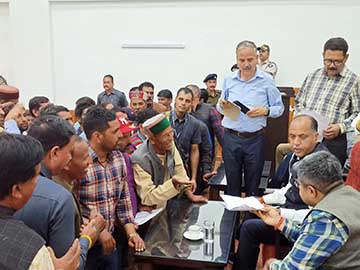There exists dichotomy of interaction between the Government and the citizens. It arises out of two opposing roles assigned to each department of the permanent executive.
On one hand, each Government field office plays the role of service delivery, while on the other the same office plays the opposite role of regulation.
In order to understand this clearly, let us take the example of the office of the Patwari or Village Revenue Officer. A Patwari provides many services to the citizens such as certified copies of land records, field reports required to obtain various certificates from the competent authorities and the like.
At the same time, the Patwari is responsible for checking encroachment and is also duty bound to report the same to his superiors.
Similarly, Municipal body officers are responsible for providing “No Objection Certificate” for electricity and water connections. At the same time, they are duty bound to take action on the violation of planning regulations by the citizens.
Even a largely regulatory department such as the State Police plays the role of service delivery in matters such as women safety, traffic management etc.
The regulatory role of the Government offices ensures the rule of law. On the other, their quality of service delivery guides public perception towards the performance of the Government and its sensitivity towards its citizens.
Public Service Guarantee Act improved Quality of Service to Citizens
In fact, the quality of service delivery has been greatly enhanced in recent years. It has been done directly by laws such as the Public Service Guarantee Act and indirectly by other laws such as the Right to Information Act.
There are two equally important aspects to service delivery. First, it is service output and second and no-less important is costumer relations.
Unfortunately, output of services in offices is adversely affected by the overall unsatisfactory state of administrative machinery.
Government is Regulator Rather Than Service Provider
However, the lack of effective costumer relations is more attributable to the feudal mindset of individual officers and officials.
This can also be equally attributed to a flawed self-image of the Government sector. Public perception about government is that it is a regulator, rather than a service provider.
Learning the Art of Customer Relations from Private Sector
In contrast, the art of effective customer relations has been effectively perfected by the private sector since decades. In recent years, there are a few Government departments e.g. Passport Offices, which have bettered costumer relations and service delivery. 
These departments have done it by outsourcing services to private enterprises such as the Tata Consultancy Services. Such successful experiments provide the costumers of the Government i.e. the citizens a reason to support the privatisation of this very important function of the Government.
Even though this may be a cost-effective way to deal with the problem of costumer relations, it also puts at risk, two important related matters.
First, it threatens the very survival of a large percentage of Government employment in the near future.
Secondly, irrespective of its cost benefit to the exchequer, it makes end services more expensive for the common and poor citizen, as has been proven by the Passport Office model.
Hence emerges the practical and urgent need to orient Government offices towards effective costumer relations.
It could be challenging to draw a balance in favour of costumer relations by a single individual holding responsibility of both public services and regulation.
For example, a Sub-Divisional Officer (Civil) may not be taken seriously by some people in his or her magisterial duties, if he/she is being too friendly and over-courteous towards citizens seeking driving licences in the office.
SDM’s Courtesy to Citizens Can be a Game Changer
However, various employees of the office of a Sub Divisional Magistrate can easily combine their efforts to collectively present an image of a successful costumer relation strategy.
Although this technique has been referred here in two short lines, the overall objective of effective costumer relations in any office would require diligent planning and execution.
That being said, courtesy and a positive communication attitude will always remain the basic tenants of effective costumer relations.
In the case of a Sub-Divisional Magistrate, the basic courtesy of offering a chair to a citizen walking into his/her office will establish a practice of effective costumer relations, without compromising his/her effectiveness as a magistrate or collector.
While drawing a balance between switching of roles for a one-man office, like that of the Patwari may be more difficult, there can be no excuse for any multi-personnel office, not to have high-standards of effective public relations.
Another role of every Government servant, which was not mentioned in the first paragraph, is that as a member of a team aiming to achieve organisational objectives.
In this role, each Government servant is subservient towards his seniors and courteous towards his colleagues. Hence no Government servant is oblivious to the practice of courtesy in his daily interactions.
Why then, should this courtesy not be extended to the common tax-paying citizen?
The answer to this question should automatically motivate all administrators, whether from departmental services or from administrative services, to initiate processes and practices of effective costumer relations in their offices.
At the Government level, a well-thought-out policy of effective costumer relations can be considered, which may include formal training regarding the strategy and practices of effective costumer relations. This would be the next natural step in the line of administrative reforms.
About the Author:
(Prashant Sirkek is Himachal Pradesh Administrative Services Officer, 2010 Batch).




